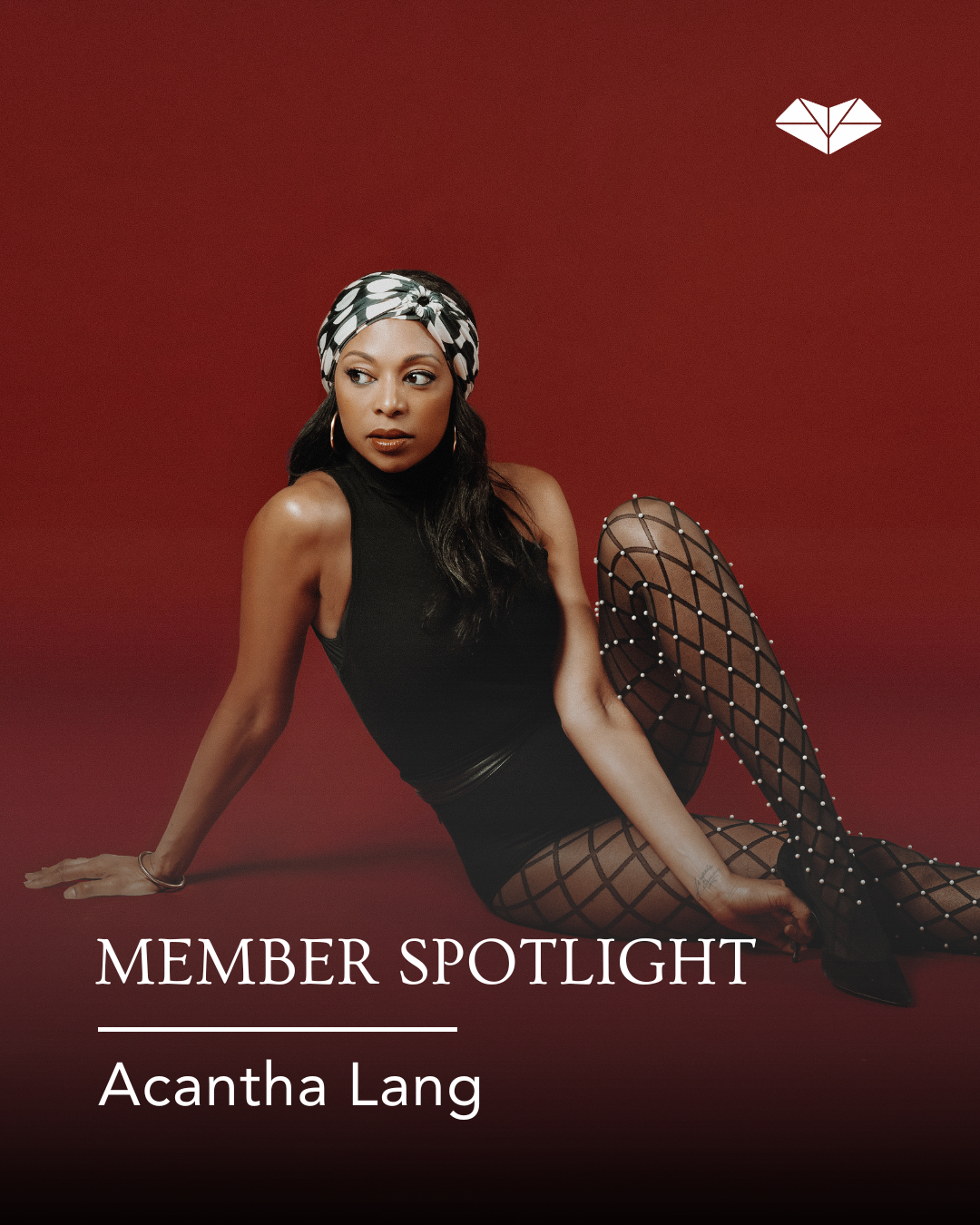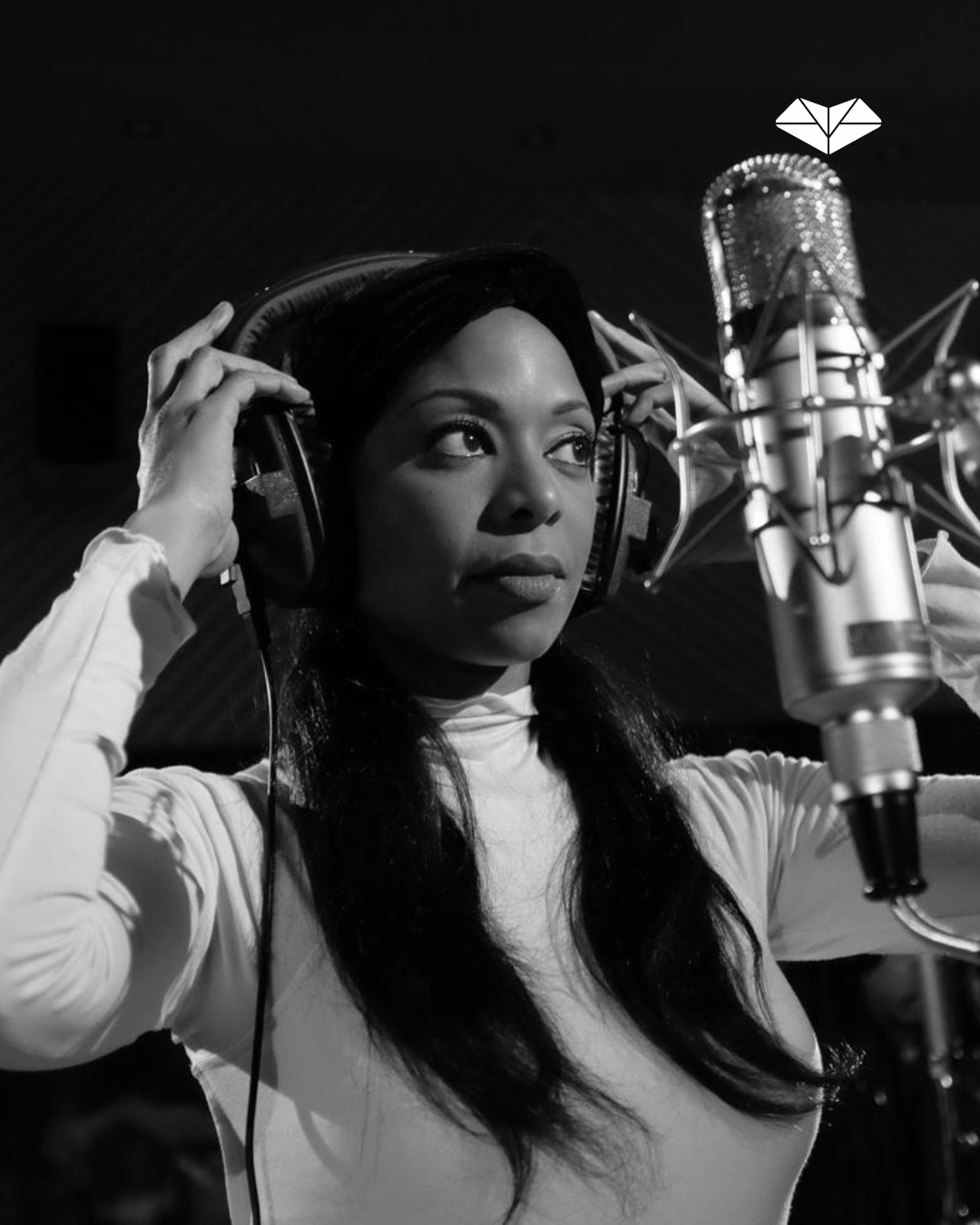Acantha Lang is a New Orleans-born, London-based soul artist whose debut album Beautiful Dreams (2023) reached #3 on the Official UK Jazz & Blues Albums Chart and earned 5-star reviews from Echoes and Soul Bag Magazine (France).
A GRAMMY-nominated songwriter and 2022 Recording Academy member, she contributed to Robert Randolph & The Family Band’s Got Soul. Her music has since earned over 5 million streams worldwide, 1.55 million YouTube views, and 13 million+ video views through her acclaimed Standing On The Shoulders Of Soul Legends series.
Her singles have been featured on top Spotify playlists including All Funked Up and Best Funk Songs of 2023, with strong radio support from BBC Radio 2, BBC 6Music, Jazz FM, and KCRW. Her track “Grandma’s Hands” was selected for Jazz FM’s Breakfast Show and featured on BBC Radio 2’s A-List and Trevor Nelson’s Top Tunes of 2024.
She also appeared on Craig Charles’ Trunk of Funk Vol. 2 compilation. Acantha has appeared on CBS Saturday Morning and performed at major festivals and venues including SXSW, Melkweg (Amsterdam), Bizz’Art (Paris), Jazz Cafe (London), and The House of Blues and Blue Nile (New Orleans).
Her music has been championed by Craig Charles, Trevor Nelson, and Gilles Peterson, while influences such as Gladys Knight, Aretha Franklin, and Mavis Staples continue to shape her artistry. Beyond her original work, she actively celebrates the soul tradition through her tribute performances. She is currently working on her second album, due for release in 2026.
How did you first get your start in music?
My music career really started when I left New Orleans and moved to New York. I put together a Blues show in Harlem, and it was there that I truly found my voice and my love for blues and soul. Around that time, I was booked at Blues festivals in the Caribbean and Africa for some really big audiences. This was all a great experience for me as an up-and-coming singer.
Before launching your solo career, your songwriting was featured on a GRAMMY-nominated album and you were accepted into the Recording Academy’s 2022 member class. What has songwriting for others taught you about developing your own voice as an artist?
Yes, one of my songs ended up on Robert Randolph’s Got Soul album, which went on to be Grammy nominated. Robert is the frontman of Robert Randolph and the Family Band and one of the world’s most celebrated pedal steel guitarists. He had always loved a song I wrote in New York with a wonderful producer called Jimmy Bralower.
The song was originally called It’s Gonna Be Alright, but when Robert decided to record it for his album, we reworked the lyrics and production a bit, gave it a slightly different title, Gonna Be All Right, and it became the closing track. I later recorded my own version, which appears on my debut album Beautiful Dreams. My version of the song sounds like me and Robert’s version sounds like him. What I learned is that the artist will always make the song their own. They’ll transform it so it sounds like them, and that’s exactly how it should be.
What have you learned about networking in the music industry? How do you approach building authentic connections?
I believe that to be a successful artist, networking is crucial. It is about building relationships with the right people, showing up in spaces, reaching out, asking questions, and being open. All of that really makes a difference.
Your reputation and work ethic go hand in hand with those connections too, because you never know when someone you spoke to, or someone who has seen your work, might recommend you for an opportunity.
When it comes to building authentic connections, I try to keep it simple. I show up as myself. I listen and I stay curious.People can feel when you are genuine, and those are the connections that last. One simple conversation can turn into great opportunities and sometimes friendships.
For artists working toward that level of visibility, what does it really take to build a sustainable career in today’s music industry?
I think building a sustainable career in music today takes more than talent. You need persistence, patience, and a real understanding that this is a marathon, not a sprint. It takes consistency, showing up for yourself every day, and being willing to put in the work even when no one is watching. And let’s be real, you’re going to need money to get your project off the ground.
This can be very expensive. Unless you’re starting out with a lot of money or backed by a label with a big budget, you need to get familiar with fundraising, applying for grants, and working to cover all the costs that come with recording, releasing, and marketing your music. It takes time to get to a level of visibility and it takes time before a career in music can sustain itself. It can be challenging, but I believe it can be done.
You’ve now crossed 3 million Spotify streams and appeared on BBC Radio 2, Jazz FM, and BBC 6Music’s A-List. For artists trying to reach radio and editorial platforms, what are your best tips to stand out in a saturated space?
I’m extremely proud of how my music is being received, but it didn’t happen overnight. I was fortunate that my debut single He Said/She Said was played on BBC 6Music by Craig Charles, but what I quickly learned is that most of the time you do need a radio plugger to get consistent radio play. In a saturated space, the best way to stand out is creating the best work possible and staying true to myself. I never wanted to chase trends. I wanted to develop my own sound and make music that felt authentic. For me, it’s always been more important to do something uniquely mine than to blend into a crowded lane.
With 1.55 million YouTube views, over 104K TikTok followers and features on high-impact playlists, you’ve created a multi-platform presence. What’s worked best for growing your audience online without relying on viral trends?
On the streaming side, being featured on Spotify’s big editorial playlists isn’t something you can control, so I feel very grateful that some of my songs have landed on a few of them. One of my proudest moments was seeing He Said/She Said included on Spotify’s Best Funk Songs of 2023. Being featured on high-impact playlists has been an amazing way to introduce my music to new listeners.
What’s worked best for me is creating content for YouTube and TikTok that I genuinely enjoy making. I share soul music through tributes, stories, and performance clips, while also highlighting the artists, their journeys, and little-known facts about them. I love digging into the history and putting those stories together, and because it comes from a real place, people connect with it. It’s helped me find others who love soul music as much as I do and build a real sense of community.
You’ve built a loyal fanbase and garnered over 13 million video views with your Standing on the Shoulders of Soul Legends series. What inspired that project, and how did it help grow your community?
I started my Standing on the Shoulders of Soul Legends series during the Covid lockdown because I could not work and I still wanted to sing. At the time, a lot of artists were doing livestreams, but I wanted to do something a little different. I decided to pick a song by one of my favorite soul artists, perform it with my guitarist in my living room, and post it online.
The very first song I covered was Let Me Be The One You Need, as a tribute to Bill Withers after he passed away on March 30, 2020. People loved it, and the response was so encouraging that the next week I chose another soul legend to cover, and then another. There were so many songs I wanted to sing that it naturally turned into a weekly series.
Since starting the series, I’ve posted over 100 episodes on YouTube, covering artists like Gladys Knight, Al Green, Aretha Franklin, Stevie Wonder, Etta James, and Otis Redding, just to name a few. Creating this series has been a reward in itself because I’m so passionate about soul music. But an added reward has been seeing new fans discover me through it, then go on to listen to my own music and become part of my journey.
As a woman in soul and funk today, what’s one lesson you’ve learned that you’d pass on to the next generation of artists trying to carve out their path?
Music will always evolve, but I think it’s important to go back to the source, study the pioneers and learn from them. One thing I’ve taken from the greats of soul and funk is that they didn’t need loads of riffs or vocal acrobatics.They relied on tone and storytelling to get their point across. For me, that has so much more impact than constantly showing off technical skills.
Who are three women in the industry who inspire you right now.
Mavis Staples, Carla Thomas, and Gladys Knight are three women who continue to inspire me. I’ve had the honor of meeting both Mavis and Carla in person, and their encouragement meant so much. I’ve seen Mavis perform several times, and she still has that deep soul that radiates and transforms the audience when you hear her sing. She has carried the torch for soul music for decades and remains a living example of its power.
I also recently met Carla Thomas, the Queen of Memphis Soul, and even performed with her. Her spirit and kindness were so genuine, and knowing she, along with Mavis, was part of historic moments like the legendary Wattstax concert in 1972, and is still out performing today, is awe-inspiring. Gladys Knight has always been one of my biggest inspirations. To me, she represents real soul and true longevity.



